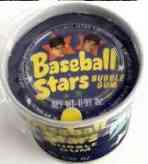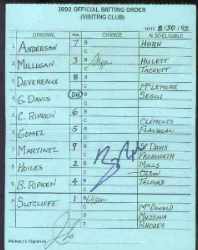1995 SP - DESTINATION FALL CLASSIC - Complete Insert Set (9)
Ken Griffey Jr,Barry Bonds,Mike Piazza,Hideo Nomo,Maddux... High prices on eBay,low on set is $29.99 and $14 for just Mattingly.

Please wander around the website for more info, prices, values & images
on vintage baseball, football, basketball, hockey, sport and non-sports cards.
Team Autographed / Signed Baseballs (P2)
Team signed baseballs were the thing well before single-signed
balls exploded on the market.
Click for our current
Autographed/Signed Team Baseball inventory
What is a "Team Signed Baseball" ??? Simple answer: A ball with XXX signatures of a certain team for a certain year. What is difficult is the XXX. Baseball tons of roster moves make it nearly impossible to "Get Them All". Generally, team signed baseballs from early 1900's had 10 to 15 signatures, the 1940's that jumped to 18 to 25. Joyce Sports Research Collection (Notre Dame) says "signatures must include only members of a specific team from a specific year, and there must be some approximation of completeness." Not concrete but to me a "team ball" MUST have ALL the team's STARS (unless a rookie or in season trade) and in today's market at least 20, preferably more, and the manager.
Determining Age of Team Signed Balls
Note: You may be on that page now. |

1970/1972/1973 Topps Candy Lids |

Authentic Major League SIGNED |

High Numbers - vintage cards were issued in the ‘50s-‘70s in a series. During the baseball season, the largest number of cards were made. As the schedule progressed into September, when there would be less interest in baseball cards , Topps for one, specifically decreased production and hence much less product was available. As a result, a scarcity-factor was created and a premium holds for these first type of "short-printed" cards.
Inserts - special randomly-inserted cards which are not part of the regular set. Many modern inserts are sequentially-numbered and rarer than the card sets into which they are inserted.
O-Pee-Chee / OPC - a subsidiary of Topps, this card issue was produced specifically for distribution in Canada.
Promotional Card - generally referred to as cards issued to show what the product will look like on release and intended to help spur future sales. Often called a "promo" card.
Reprint - cards issued to reproduce the originals. With the current trend of vintage reprints, the new versions have a distinguishing characteristic evidenced by numbering.
Restored - a card or piece of memorabilia which someone has tried to return to a "like-new" condition. A restored card is considered to be of very little value.
Rookie Card - any league-licensed, widely distributed card to feature a player in his first year of trading cards.

 Topps has tried many crazy products, called "test issues".
Mostly distributed in limited areas, test issues were scarce.
"Candy Lids" were little tubs of candy with player's photos on
bottom of a 1-7/8" lid. 10 cents/tub, 24 tubs/box.
Topps has tried many crazy products, called "test issues".
Mostly distributed in limited areas, test issues were scarce.
"Candy Lids" were little tubs of candy with player's photos on
bottom of a 1-7/8" lid. 10 cents/tub, 24 tubs/box. 

 1970 Topps Candy Lids were called "Baseball Stars Bubble Gum",
had 24 players, the 1973 Topps Candy Lids had 55.
1970 Topps Candy Lids were called "Baseball Stars Bubble Gum",
had 24 players, the 1973 Topps Candy Lids had 55.  Topps 1973 Pinups & Comics share many of the same photos.
Topps 1973 Pinups & Comics share many of the same photos.  These are the official lineup cards SIGNED BY THE MANAGER & given
to the home plate umpire before the game with the team's line-up
& batting order !!! Making them even neater, often managers made
lineup changes on these cards throughout the game.
These official lineup cards were SIGNED BY THE MANAGER and presented
to the home plate umpire before the game. They detailed the team's lineup and
batting order. Managers often made lineup changes on these cards throughout
the game, making them even more unique.
These are the official lineup cards SIGNED BY THE MANAGER & given
to the home plate umpire before the game with the team's line-up
& batting order !!! Making them even neater, often managers made
lineup changes on these cards throughout the game.
These official lineup cards were SIGNED BY THE MANAGER and presented
to the home plate umpire before the game. They detailed the team's lineup and
batting order. Managers often made lineup changes on these cards throughout
the game, making them even more unique.
